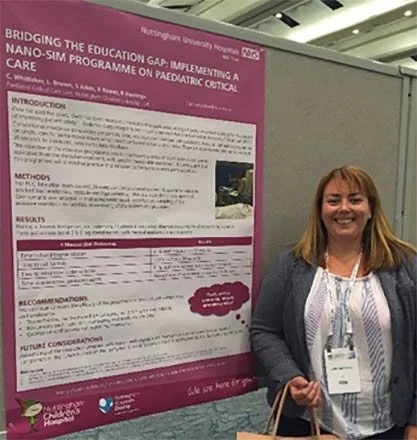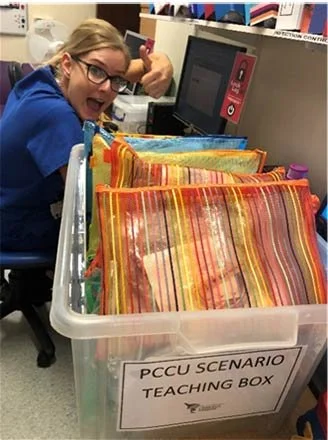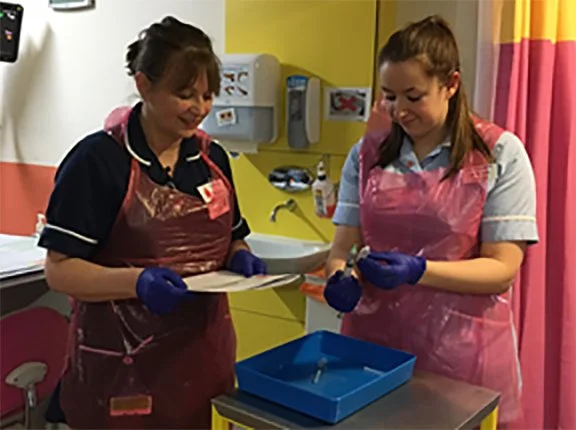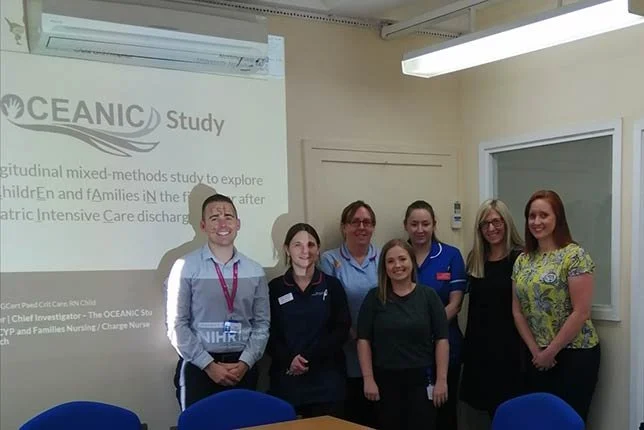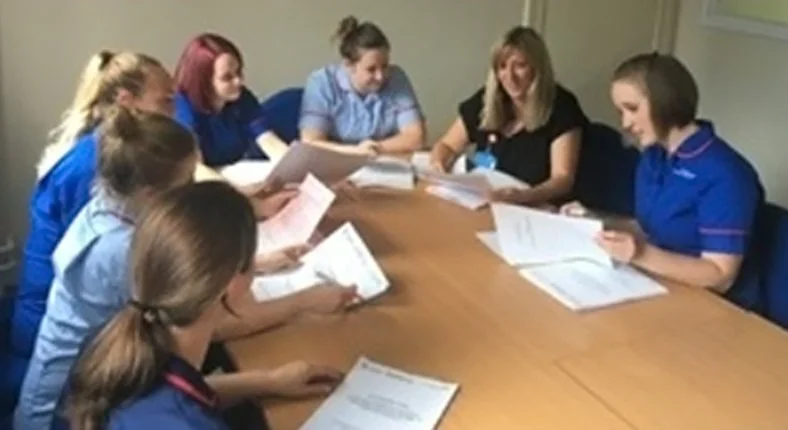Advanced Roles on PICU
Nursing roles
A career in PICU offers a huge range of opportunities for nurses. As part of our 2020 International Year of the Nurse celebrations we highlight a number of roles which are all crucial to the provision of safe, effective care of critically ill children and young people. PCCS members present a summary of different roles and career pathways available for nurses working in PICU and explain the importance of their role.
A. Education
Carli Whittaker is Vice President Nursing, PCCS and is currently employed in a collaborative role in Nottingham; as a Sister in PICU and as the Director of Clinical Skills, School of Health Sciences, University of Nottingham. This role evolved after being the Educator on Nottingham PCCU for 12 years. Below Carli describes the importance of clinically-based education roles within Paediatric Critical Care to facilitate staff development from novice – expert.
“Education within PCC is a fundamental component to provide safe supportive care, guidance and career progression for the workforce. The educational journey for nurses commences on day one and continues throughout their career. The education teams provide the foundations and fundamentals to embed the necessary skills and competence to the workforce. This ultimately impacts significantly on the recruitment, retention and resilience of our nursing workforce. The PCC nursing workforce requires specialist post-registration education to enable the delivery of safe, evidence-based, and quality care.
There is a sub-group of PCCS made up of PICU/PCC Educators from across the UK (PCCS-E). The group have developed standards for orientation programmes for nurses for both Level 1&2 and Level 3 specialist education programmes, as well as national trauma competencies for paediatrics. There is on-going work surrounding national competencies for the nursing workforce that is transferable between PICU’s, as well as educational programmes and competencies for our non-registered workforce. Some members of the PCCS-E group are successfully delivering specialist education programmes for both High Dependency and Intensive care nurses, meeting the required PCCS standards and offsetting the large financial burden of the Higher Education sector. The Paediatric Critical Care Educators ambition is to deliver robust, standardised, quality-assured education for all nurses, from registered new starters to experienced staff, cost-effectively. The role of the educators gives insight into the unknown and enthusiasm and passion for learning. Educators with genuine clinical credibility are a power force for change.”
B. Advanced Nurse Practitioner (ANP)
Hannah Rogé has 16 years of PICU experience and has been an ANP for 8 years; with a split 50:50 role with PICU at Birmingham Children’s Hospital and KIDS (children’s intensive care and decision service) retrieval team.
Hannah describes the place of ANPs in critical care provision and highlights how the ANP role is an opportunity for expert nurses to develop a role which remains focused on the care of patients and families.
“Career pathways in PICU have constantly evolved to meet the demands of patients and families, moving away from the ‘traditional’ nursing skill set in response to the service needs, advancing evidence basis and technical innovation. The senior PICU nurse with the most clinically based experience, wide skill set and level of competence, have historically followed senior roles in education or leadership. This moved valuable experience, clinical insight and skill set away from the patient bedside. Advanced nurse practitioner’s answers the gap in the career prospects for PICU nurses wanting to focus on the clinical domain.
Advanced nurse practitioners within PICU undertake a role that is clinically focused, with responsibilities in all four pillars of advanced practice; clinical practice, education, leadership, and research. There is a rigorous training period which combines advanced patient assessment and management, consultant-led supervision, invasive technical competencies such as, anaesthetic and airway skills, leadership, resuscitation and stabilisation, vascular access, differential diagnosis, independent prescribing, autonomous decision-making and patient caseload management. They undertake an MSc in advanced practice in parallel to ‘on the job’ training. Although ANP’s embark on a role conventionally seen in a medical field, they work with a collaborative ethos that compliments the medic’s training, utilising the unique skill set acquired from years of nursing practice and development in the PICU. Ultimately, this training equips them with unique skills and offers a fantastic development opportunity for nurses to meet patients, families and service needs and great career satisfaction.”
For more information on ANP career pathways in Crit care:
Fleming, G, Carberry, M. (2011) Steering a course towards advanced nursing practitioner: a critical care perspective. Nursing in Critical Care. 16(2) p 67 – 76. https://pubmed.ncbi.nlm.nih.gov/21299759/
For further information on training framework and standards:
Lee, G et al (2018) Advanced critical care practitioners – practical experience of implementing the advanced critical care practitioner faculty of intensive care medicine curriculum in a London critical care unit. Journal of Intensive Care Society. 19(2): p147-154. https://www.ncbi.nlm.nih.gov/pmc/articles/PMC5956686/
C. Research
Julie is a Nurse Researcher on PICU, Birmingham Children’s Hospital and is an elected nurse representative to PCCS Council. Julie has 21 years of experience on PIC, 12 years of which are also in research; working first as a research nurse and now as a nurse who leads and conducts her own research in the field of critical care. Below Julie describes why research nurses are needed in PICU and also the importance of developing nursing research.
“Conducting research within PICU under normal circumstances is recognised to be challenging. In most circumstances, the child is too unwell to participate in the process of informed consent and parents need to make decisions in time-critical situations and at a time of extreme anxiety. Research nurses working in PICU are vital to support research activity and help address these challenges. Their role is to provide information about research to families, support the informed consent process, support staff carrying out the research protocol requirement or intervention, monitor participants, collect data and report any adverse events. Close working relationships with clinical teams and insight into PICU care delivery are vital. PICS Study Group has a large portfolio of funded national and international research and research nurses are invaluable to help ensure this research is successfully completed. However, there are also a growing number of nurse researchers within the PICU field; nurses, who have undertaken further academic study at Masters and Doctoral level and develop their own research with the aim of advancing nursing science. PCCS is proud to have a number of Nurse Researchers as co-applicants or leading PCCS portfolio studies and is committed to helping support the development of clinical academic careers at all stages. COVID-19 has highlighted the importance of research in the critical care environment to understand the disease, identify effective treatments and gain insight into how we support people in their recovery. Nurses play a vital role in this.”
For further insight into research nursing in PICU during COVID-19 see the blog by Lauran O’Neill and team at Great Ormond Street https://www.nihr.ac.uk/blog/covid19researchvoices-diary-of-an-icu-nurse/24977 and a more in-depth discussion about the importance of research nursing and nursing research from the team at Birmingham Children’s Hospital (Menzies et al, 2020) https://doi.org/10.1111/nicc.12531
D. PIC Management and leadership
Tracey is a Sister on PICU, Bristol Royal Hospital for Children and has extensive nursing experience both clinically and managerially in Paediatric Critical Care, including a previous post as Matron for PICU and working with the Paediatric Critical Care Society Managers group. Below she describes the value of nurse leadership and management posts in paediatric critical care provision.
“Nursing has changed over many years and the need for ‘behind the scenes’ work is now more important than ever. Managerial posts in Paediatric Critical Care (PCC) are vital to ensure services are in line with local and national guidance, staff have the appropriate training and education and governance measures are in place to ensure safety and quality. PCC provision can be unpredictable with fluctuations in bed occupancy, particularly in the winter months, and every year managers spend a huge amount of work planning for this period. This work is done in conjunction with all paediatric services to ensure patient flow across all domains and ensure children and young people receive optimum care. Managers therefore need to have excellent communication skills, diplomacy and drive to maintain a high quality of service provision. PIC capacity is a vital resource and the managers’ role is vital to maximise availability. Managers have a huge remit and responsibility; from budgets, workforce planning, HR management and business cases and striving to always stay one step ahead of emerging situations and challenges. This was apparent at the height of the COVID-19 crisis when the importance of good leadership in critical care service provision was highlighted:
Although patients and families are a priority, it is also imperative that we care for our staff and their wellbeing. Every day we care for critically ill children and their families under challenging circumstances which can have a huge impact on both the physical and emotional health of our workforce. Recognising those who need support can be difficult in a large workforce and managers need to provide information for staff to access help, listen to staff concerns and feedback and create a culture supportive to staff wellbeing. Moving into leadership roles may move the nurse away from the immediate bedside, but the role remains patient focused with the needs of the child and family at the heart of service provision.”
There are a wide range of career opportunities for nurses working in Paediatric Critical Care services. Please speak to your managers for further information about local opportunities or contact PCCS (email address) if you have a question about roles in education, advanced practice, research or management.


